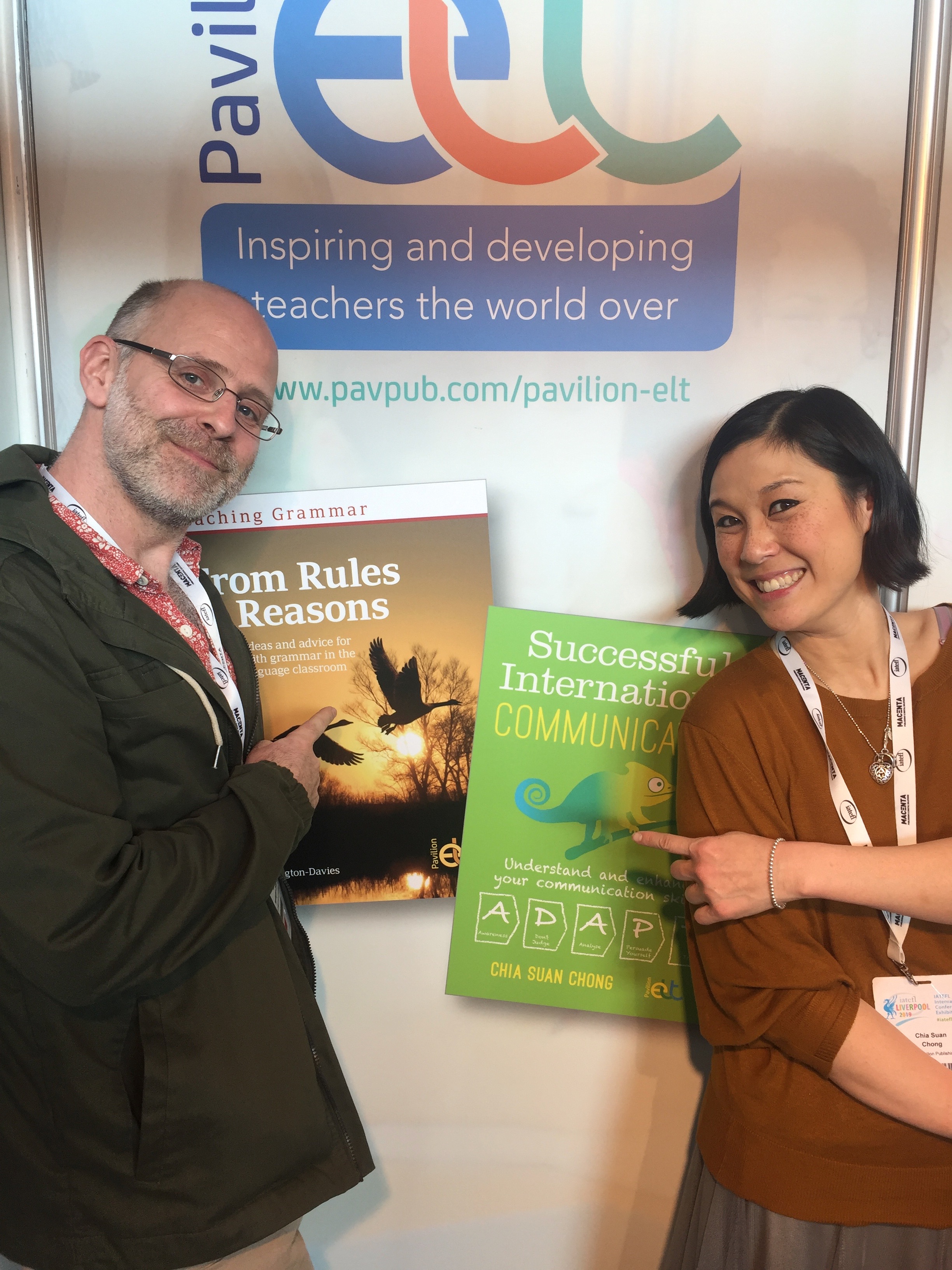My last blogpost for ETp – 10 reasons why teachers should blog
After 8 years of continuous blogging for ETp, Chia Suan Chong writes her last blogpost and shares ten reasons why all teachers should blog.

Me with my husband Mike and baby at the IATEFL Harrogate conference in 2014
The time has come for me to hang up my hat as ETp’s loyal resident blogger.
173 blogposts. Over 210000 words.
In my 8 years of blogging fortnightly for ETp, I’ve written from five different cities - through holidays, through changes in my career, through three periods of maternity leave. I’ve taken on different roles as I continued to blog: as a teacher, a teacher trainer, a communication skills trainer, an intercultural skills trainer, a writer, a freelancer and an educator.
I’ve explored the working hours of a teacher, our shift from being knowledge givers to facilitators, and issues of language change and identity.
I’ve considered different teaching circumstances, the need (or lack thereof) for teaching English culture in the English language classroom and what it means to be fluent (to the layperson and the language teacher).
I’ve angered some people with controversial blogposts suggesting that native speakers aren’t perhaps the best communicators in the world, arguing that pre-teaching might not be the best thing to do, challenging the language rules we live by, listing the disadvantages of an IWB, proposing that we should get rid of TP points in teaching training and stating that warmers and fillers are a waste of time.
I’ve looked at practical activities using the corpora, criteria for using tasks, mindfulness activities for the language classroom, and ways we can help our students see things from different perspectives.
I’ve written about using technology in the classroom, my view on technology for young children, and how we can use Whatsapp and IM with students.
I’ve shared personal stories about my name (and whether our students should have English names), my toddlers learning language, (what SLA can learn from FLA) and my pastry-buying encounter at the local petrol station.
I’ve blogged about the changing seasons, diversity and inclusion, the Sapir-Whorf Hypothesis, drilling and behaviourist methodologies and team teaching.


Me with the ETp team in 2017 catching up just before the ETp Live! conference in Brighton
People have asked me what my favourite blogposts are and I simply can’t decide…it’s a bit like asking me which one of my children I would call my favourite. I just love them all.
And I’ve loved every single opportunity to research, experiment and share my thoughts and my learning with you. I know I’ve gained so much from all the blogging I’ve done and all the dialogue that my blogging has sparked.
I can only urge you to take up blogging yourself. Here are ten reasons why every teacher should blog:
1. Blogging helps you reflect
One of the most useful things about blogging is that it forces me to consider what I do and why I do it; what I know and what it all means to me. As we seek to justify our choices to the readers, we find ourselves re-thinking what we take for granted and perhaps even changing our beliefs, our attitudes and our behaviour in the process.
2. Blogging helps make the abstract concrete
I sometimes think I know something until I try to write it down. Then I realise how abstract our ideas/opinions/beliefs are. Blogging can give clarity, structure and definition to our thoughts and make the abstract concrete.
3. Blogging pushes you to learn new things
I’ve written many a blogpost about a topic that I might not know a lot about to start with, like this one on imposter syndrome. But when I decided on the topic, the impending blogpost pushed me to invest time into researching the topic and learning more about something I would have otherwise been ignorant about.
4. Blogging helps you keep a record
I’m an avid note-taker and I learn and process information by taking notes.
I used to keep stacks of notebooks and reams of paper filled with my notes – notes that I have taken on a course, in a conference workshop, in class or when I’m reading something online. These notes don’t often get a second look-in and end up cluttering up the study and getting lost in some drawer somewhere.
My blog has become a bit like my online notebook. It allows me to keep a record of my thoughts, my ideas, my processes and the things that I am learning. Whenever I need to re-read it or share it with a colleague or friend, it’s easily accessible online. My blog in many ways is a written record of my professional development.
5. Blogging allows you to share
They say sharing is caring, and in this age of social media and online materials, it certainly is. Gone are the days of selfishly holding on to a teaching idea or lesson plan because you hope to copyright it someday.
Blogging allows me to share my thoughts, my ideas and my opinions with the world out there. And it allows people who have found it interesting or useful to re-share it with their friends and colleagues. It always brings a smile to my face when I learn about the people who have benefitted from the sharing the blog has allowed me to do.

Me with the ETp team in 2019 celebrating at the British Council ELTons awards ceremony
6. Blogging enables you to connect with people
There is a huge online community of teachers from all over the world searching for ideas, having valuable conversations and seeking out an emotional connection with those in the same industry with the same passions.
In my 8 years of blogging for ETp, I’ve connected with so many fellow practitioners and educators, and I’ve expanded my ‘staffroom’ and personal learning network as a result.
7. Blogging gives you feedback on your ideas
Sometimes, a teacher or trainer reads my blogpost and feels compelled to write a comment in a thread that it’s shared in. Sometimes, a discussion or debate might ensue. Feedback might not be always positive (see above on blogposts I’ve written that have ‘angered’ many) but they are always valuable.
It gives me a chance to start a conversation about my ideas, my practices and my approach. In defending them, I realise what is important to me and what needs changing. And when feedback is positive, I realise I am not alone in my thoughts and methods.
8. Blogging creates reading material/training material out of your posts
I often hear from teachers that my blogposts have been used as a reading text for their students, a supplement or pre-course reading for teacher training courses, or a discussion point for reading groups in staffrooms (in particular the controversial posts!).
When I’m delivering a course, I sometimes find myself sharing a link to a blogpost that I’ve written which conveniently explores and explains everything I’m trying to illustrate on the course. Some blogposts can serve as instant teaching/training material that you can share with students/trainees.
9. Blogging helps to improve your writing skills
Putting my thoughts in more than a thousand words every fortnight has no doubt helped me to be clearer in what I say and how I say it. It has helped me to think of my readers and their interests and needs. And perhaps I’ve become a better writer in the process.
10. Blogging can help you make a career out of writing
I know several teachers who wish to make an alternate career out of writing. Blogging is a great way to start doing this. A blog is a platform for your thoughts and ideas; it displays your writing abilities, and it gains you visibility in the industry. And with many available blogsites online, blogging is free. The only investment you need to make is time.
I’ve gained so much from blogging and being your ETp resident blogger, but unfortunately, the one resource I’m currently short on now is time. Due to other work and family commitments, it is perhaps time for me to pass the baton on to another blogger who would share their thoughts, their expertise and their experience with you.
I’ve enjoyed being able to speak to you, my reader, so directly and so frankly, for the last 8 years. And I know I will miss it so very much.
But I’ll be around…and so will all the blogposts that I’ve written.
See you!

Me with Danny proudly posing in front of our books at the Pavilion ELT stand at IATEFL Liverpool 2019


Comments
Write a Comment
Comment Submitted